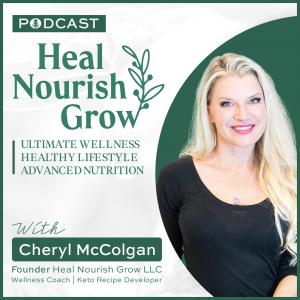Heal Nourish Grow Podcast

Gut Health, Histamine Intolerance and What to do About It
Dr. Meg Mill discusses the need to consider histamine issues when addressing gut health. She explains the role of histamine in the body and how it can affect various body systems. Register for FREE with this link for the Histamine Summit to hear more in depth discussions of this topic. Check out my previous interview with Dr. Meg on migraines and headaches. Takeaways Functional medicine offers personalized approaches to address health issues that conventional medicine may not be able to resolve. Histamine issues can affect gut health and lead to various symptoms such as digestive issues, anxiety, and hormone imbalances. Histamine intolerance can be caused by genetic factors, imbalances in the gut microbiome, and nutritional deficiencies. A low histamine diet can be used as an investigative tool to identify trigger foods, but long-term solutions should focus on addressing the underlying causes of histamine intolerance. Histamine intolerance can be associated with symptoms such as nasal congestion, headaches, fatigue, anxiety, and joint pain. The Reversing Mast Cell Activation Syndrome and Histamine Intolerance Summit provides valuable information from experts in the field to help individuals understand and manage histamine-related issues. Visit Dr. Meg Mill online at MegMill.com. Free Gift: The Essential Guide to Histamine Intolerance https://youtu.be/hAkB3XwuBrY Episode Transcript Cheryl McColgan (00:00)Hi everyone, welcome back to the Heal Nourish Grow podcast. Today I am joined by Dr. Meg Mill and she has been a guest on the show before so I forgot to look up the episode but that will be in the show notes so if you're listening to this it was another great episode with her before be sure you go check it out. But before we get started we got a great new topic today which I'm super excited about and also a cool summit that Dr. Mill is running coming up so more on that later. But first Dr. Meg if you could just share with everybody. your background, your PharmD, you now do a functional medicine practice. So I'd love for you to just share how you got into all that for people that didn't listen to the interview yet. And then we'll start chatting about our new topic for the day. Meg Mill (00:40)Yes, yes. Well, so I, like you said, I graduated with a doctor of pharmacy and then I actually went on to do a residency and was practicing as a clinical pharmacist. And I kind of have two reasons that I switched to functional medicine. And one was that I knew all the protocols. I knew what to do. We had what we should do and people just weren't getting better. I'm like, okay, we're putting them on more medication, but we're not seeing them improve. It's just like, okay, we're sustaining this place. And then at the same time, I was having a lot of my own health issues. So I was having, you know, a lot of digestive issues. I was having anxiety. I actually started getting panic attacks. And that was when I was at the point where I have to change. So I remember sitting, like my kids are playing on the beach and I'm sitting there and I'm like, okay, I'm here, but I'm in so much, like my stomach's upset. I can't eat anything. I, you know, I'm having all this anxiety. I need to make a change in my life. And that's kind of when my journey shifted and I started to really look into more holistic ways of healing. And that led me to find functional medicine for myself and finally get answers. I've been to like five different gastroenterologists I you know was we moved a lot at the time so I'd be like I'm gonna get an answer now when we moved to a new place and it just it was just not everyone said you're fine you look like the picture of health of Listeners if you've been told that and you feel terrible go with your instincts because that is not true But when I finally found answers, I was like I need to share this with others. I opened my virtual practice






 Visit Podcast Website
Visit Podcast Website RSS Podcast Feed
RSS Podcast Feed Subscribe
Subscribe
 Add to MyCast
Add to MyCast